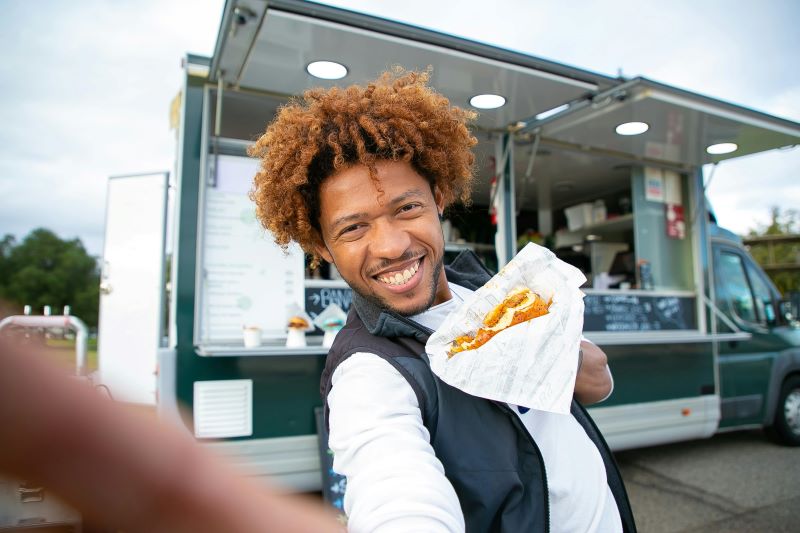Photo by Kampus Production from Pexels
America’s culinary history cannot be told without referencing the impact of food trucks as an entrepreneurial vehicle in shaping some of the growing food businesses that have continued to contribute to the growth of its economy as well as create jobs for many of its citizens.
From Boston to Detroit, San Francisco to Seattle, these meals on wheels not only caters to a diverse range of crowd from the rich to the poor, and across all races and genders, they are also incubators for entrepreneurs looking into the food industrial sector.
The industry has been on steady rise with many entrants exploring this sector due to several factors chief among which is its low cost of entry. As noted by the U.S Chamber of Commerce Foundation in its Food Truck Nation: U.S. Chamber of Commerce Foundation Food Truck Index report “Food trucks are estimated to have reached $2.7 billion in revenue in 2017. Though this figure is still a small portion of the nearly $799 billion in expected restaurant sales for 2017, the estimate represents a sizable increase from its $650 million in revenue from just a few years prior, and relative nonexistence in 2008.
According to IBISWorld, the food truck industry grew at an average rate of 7.9% per year since 2011, reaching 3,703 trucks and 13,501 employees, by the end of 2016. These numbers come from previous year tax filings of companies that select the NAICS code for Mobile Food Services (722330). This number should be seen as a floor to the number of trucks that paid taxes in 2015, since it won’t necessarily include trucks that are part of brick-and-mortar institutions, or a single company running multiple trucks.”
In Philadelphia, the mobile food truck business has continued to remain a thriving industry in the city. Meeting not just the daily cravings of the everyday worker on the move but also offering catering services as alternative options for those eager to spice up their events and offer guests other sources of culinary entertainment.
For black residents in the city of brotherly love, owning and operating a food truck business is a great start to further expanding into the brick and mortar status of a full fledged business as the venture does not necessarily require a huge startup cost, does not require an extensive licence permits and certificate, an expensive degree, connections nor is it cost intensive to operate as compared to starting and owning a restaurant or other food services facility from the get-go.
Transitioning into full fledged eateries and restaurants become easier as is with the case of Bake’n Bacon and Cloud cups, two black owned businesses that have achieved the transition from a food truck stand into a full-fledged brick and mortar location.
Having watched their business evolve through different stages up to opening a store after 4 years as is the case with Cloud Cups, ventures such as theirs provide inspiration of the possibilities that exist from black businesses looking to succeed in Philadelphia.
Starting a Food Truck Business
As its customary for many startups, owning and operating a food truck business is not something that occurs at the drop of a hat. Passion it’s not enough reason to start up a food truck business, it is important to also weigh the cost implications as well as the challenges that are likely to be encountered when starting off a food truck business.
Understudying other Philadelphia food truck owners can be a good place to start when looking for support or guidance on how to succeed in the specific venture. Understanding the regulations and licensing that are required to start off is key if the business must satisfy the city’s regulatory requirements.
Associations like the Philly Mobile Food Association are a good place to find both support and counsel to guide new entrants into the industry.
Next step is to pick out a winning concept that not only distinguishes your business but guarantees a continued flow of patronage which quite frankly is key to the business survival and expansion. Beyond just the usual off the curb sales to customers, businesses are now more attuned to branding that aids visibility both online and offline. Customers need to be afforded something unique beyond what they are used to.
Figuring out the start up costs for a food truck business is the next step in starting your business. Some of the likely costs that might need to be addressed are the permits and licensing as well as insurance, the cost of truck, as well as maintenance and upkeep, commissary fees as well as inventory.
Having an off site kitchen where equipment is cleaned, food is stored or prepped is needed according to Philadelphia requirements. Finding and taking into consideration the cost of rent is necessary as part of the success to your food truck business.
Getting a Food Licence in Philadelphia
The city of Philadelphia makes provision for licences for those interested in running a mobile retail food business. Its Food Establishment Retail, Non-Permanent Location caters for Food Trucks, Movable Stands, and Carts. Supervising its issuance is the Department of Licenses and Inspections (L&I).
Other licences that are required by the city of Philadelphia are the Business Income and Receipts Tax ID (BIRT), Commercial Activity License and the Plan Review and License Eligibility Report (LER) which is issued by the Philadelphia Department of Public Health.
Cost of obtaining a licence is about $165 with a non-refundable application fee expected to be deposited towards obtaining the licence. This registration cost applies to new entrants into the industry as well as those hoping to renew their licence with a 1.5% charge for each month after the expiration for those who fail to renew more than 60 after the due date.
Applications can be done online using the eClipse or by booking an appointment at the Permit and License Centre in Philadelphia. To learn more on the requirements for registering to obtain and operate a food truck business in Philadelphia you can visit : Get a Food Establishment Retail, Non-Permanent Location License | Services | City of Philadelphia

Okechukwu Nzeribe works with the Onitsha Chamber of Commerce, in Anambra State, Nigeria, and loves unveiling the richness of African cultures. okechukwu.onicima@gmail.com





